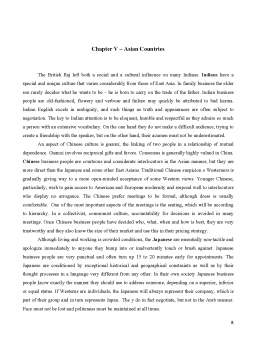Cuprins
- Introduction 3
- Chapter I – English-Speaking Countries 4
- Chapter II – Western European Countries 5
- Chapter III – Central and Eastern European Countries 6
- Chapter IV – Middle Eastern Countries 7
- Chapter V – Asian Countries 8
- Chapter VI – Latin American Countries 9
- Conclusions 10
- Bibliography 11
Extras din proiect
Introduction
Negotiation is a basic human activity. It is a process we undertake in everyday activities to manage our relationships, such as between a husband and wife, children and parents, employers and employees, buyers and sellers and business associates.
Cultural factors play an important role in international business negotiations, the most important cultural factors being the time, individual or collective behavior, the pattern of communication and the emphasis on personal relations.
Time has different meaning and importance in different cultures; while “time is money” in the Western culture, it has no such value attached to it in many cultures in Asia or Latin America.
Regarding the individual vs. the collective behavior or the pattern of communication, it is very important to have knowledge of these attributes, as it will help that person to formulate effective strategy in negotiations.
In many countries in the West, the negotiators are more concerned with the issue at hand and the future relationship between the organizations, irrespective of who is representing these firms, while in some cultures, the personality of the negotiator is more important than the organization he is representing or the importance of an issue. So the emphasis on personal relations can be different in different negotiations.
This project contains information about the most representative cultures regarding international negotiation as American, Japanese, Mexican, Arab and other cultures. All these cultures presented in the project are classified by the geographical region as: English-Speaking Countries, Western European Countries, Central and Eastern European Countries, Middle Eastern Countries, Asian Countries and, the last but not the least, Latin American Countries.
Chapter I – English-Speaking Countries
American business people have the reputation of being the toughest in the world as their business philosophy is uncomplicated; their aim is to make as much money as possible as quick as they can. Their God can be considered the dollar, which is why this single-minded pursuit of profit results in their often being described as ruthless. Over time, American business people showed the following tendencies at meetings: they are individualistic, introducing informality immediately, they use humor whenever they can, they also try to extract at least an oral agreement at the first meeting and one of the most important tendencies they are opportunistic using words like fair, democratic, honest, good deal, value and assume as they think the other part would be impressed in a good way. One of their negative aspects could be the fact that Americans feel they are the best and assume that American norms are the only correct ones.
The British feel more comfortable with other English-speaking nationalities, with whom they also have little difficulty in establishing an easy-going but effective relationship. Moreover, British business people are divided in two categories: the class-conscious Southern English, who show you their civilized and educated side and the more hard-headed northern English, Scots or Welsh who like sincerity and straight, uncomplicated dealing. At business meetings the British seem to be rather formal at first, but on the other hand, they like to show themselves as family oriented and it is normal to discuss children, vacations and reminiscences during and between meetings. As an aspect which make British business people unique is their humor, especially irony and sarcasm, which can be used as a weapon in ridiculing an opponent or showing disagreement or even contempt. Their sarcasm is rarely used against Nordics as they are modest, but they use humor cruelly against Latins and overly demonstrative people.
Chapter II – Western European Countries
Germans need less personal space and independence at work that Scandinavians or Americans, but they enthusiastically protect their rights to what space they have. German business people have their own style of conducting meeting and negotiations, being the most punctual of all nationalities. Foreigners arriving late for appointments will be reminded of their lateness, which will be a sign of unreliability by Germans. “Arriving late” may mean a delay of only two or three minutes, because their action plans and schedules are strictly observed. Their negotiating style is recognized for their discipline, frankness and so on. They will always arrive well informed at meetings and will present logical, often weighty arguments to support their case, the truth coming before diplomacy.
In both politics and business, the French like to be independent and can appear frustrating to Americans, Japanese and Europeans alike. French business people could be characterized as weird ones as they seem to be more exact than Germans are. They arrive at meeting formally dresses, regarding it as a formal occasion, surnames and formal introductions are used, and seating will be hierarchical. Another aspect which makes them unique is that the French pride themselves on quickness of mind, but dislike being rushed into decisions because for them, negotiation is not a quick procedure. Other nationalities criticize French business people, finding them “out on a limb” at international meetings, isolated in their intransigence when all the others have settled for compromise. This naturally leaves them open to charges of arrogance, thinking that they have a better historical perspective than most of us.
Preview document
Conținut arhivă zip
- International Negotiating Styles.doc





















